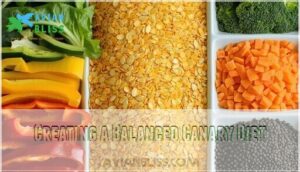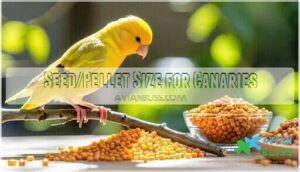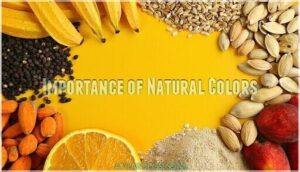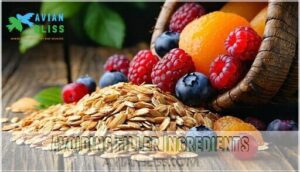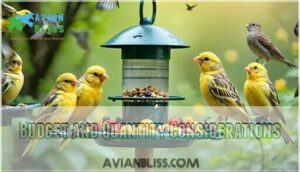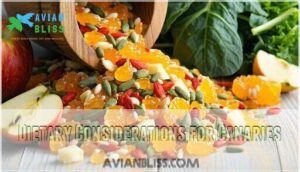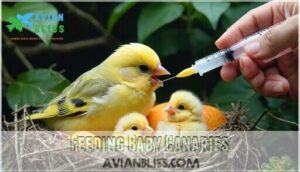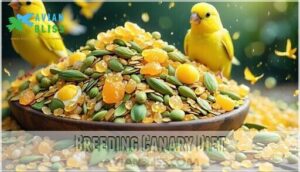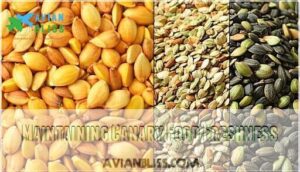This site is supported by our readers. We may earn a commission, at no cost to you, if you purchase through links.
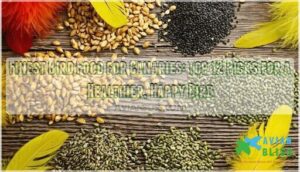
Look for blends containing canary grass, flaxseed, and niger seed as your foundation. Premium options like ZuPreem FruitBlend pellets provide balanced nutrition, while Kaytee’s finch blends offer variety your bird craves.
Don’t overlook fresh additions like endive seeds and hemp for extra protein. Quality matters more than quantity – avoid fillers and artificial colors that can harm your feathered friend’s health.
Your canary’s vibrant plumage and cheerful song depend on proper nutrition. The secret lies in understanding which specific ingredients boost their energy and longevity.
Table Of Contents
- Key Takeaways
- Essential Canary Food Nutrition
- Creating a Balanced Canary Diet
- Choosing The Right Canary Food
- Top 12 Finest Bird Foods for Canaries
- 1. ZuPreem FruitBlend Bird Pellets
- 2. Kaytee Finch Bird Food Blend 5lb
- 3. Wild Bird Seed Collection Daily Blends
- 4. Kaytee Canary Finch Food 2 lb
- 5. Wild Harvest Bird Food Orange Flavor
- 6. Wild Harvest Canary Finch Seed Mix
- 7. Dr Harveys Canary Food Blend Natural
- 8. Quiko Red Canary Food Supplement
- 9. Vitakraft VitaSmart Bird Food Supplement
- 10. Volkman Canary Seed Blend 4 Lb
- 11. Quiko Egg Food Bird Supplement Daily
- 12. Kaytee Supreme Canary and Finch Food
- Dietary Considerations for Canaries
- Feeding Canaries for Optimal Health
- Canary Health and Nutrition Supplements
- Maintaining Canary Food Freshness
- Frequently Asked Questions (FAQs)
- What is the best food for canary birds?
- What is the best seed for canaries?
- What is the best bird seed to attract colorful birds?
- What is the best color feed for canaries?
- What is the best bird food for a canary & Finch?
- What do canary birds eat?
- How do I choose the best canary bird food?
- Can a canary eat commercial bird food?
- What is the best food for Canaries?
- Do canaries make good pets?
- Conclusion
Key Takeaways
- You’ll need a balanced foundation of canary grass seed, flaxseed, and niger seed to provide essential proteins, healthy fats, and nutrients that support your bird’s energy levels and vibrant feather development.
- You should choose high-quality pellets like ZuPreem FruitBlend or premium seed mixes from brands like Kaytee that contain 21 essential vitamins and minerals while avoiding fillers like cracked corn and artificial colors that can harm your canary’s health.
- You can’t rely on seeds alone—supplement your canary’s diet with fresh leafy greens like kale and safe fruits like apples (seeds removed) to provide vitamin A for feather health and calcium for strong bones.
- You must store canary food in airtight containers in cool, dry places and watch for spoilage signs like mold, rancid odors, or pest infestation to maintain nutritional value and protect your bird’s digestive system.
Essential Canary Food Nutrition
Your canary’s health depends on a precise balance of proteins, fats, and carbohydrates to thrive.
Providing essential vitamins and minerals guarantees strong bones, vibrant feathers, and a healthy immune system.
Nutritional Content for Canary Food
Your canary’s health thrives on a well-rounded diet packed with exceptional nutritional value.
Aim for a balance of 10-12% proteins, 4-5% fats, and 65-70% carbohydrates daily.
Proteins, the building blocks of health, keep your bird active and its feathers gleaming.
Healthy fats provide energy, while fiber helps to make digestion smooth.
Essential vitamins like A, D3, and E boost immunity, and minerals like calcium and phosphorus support strong bones.
Pair high-quality seed mixes with pellets to prevent deficits in nutrition—because your feathered friend deserves nothing less than the best!
Role of Protein in Canary Food
Protein fuels your canary’s vibrant life, promoting feather development, muscle growth, and overall vitality.
It’s indispensable for molting, flight, and even enzyme production that keeps their bodies running smoothly.
Without it, your bird may struggle with energy and resilience.
- Feather Development: Protein strengthens those delicate, colorful feathers.
- Egg Laying: Female canaries need protein for healthier egg production.
- Immune Support: Protein builds defense against illnesses, keeping your pet happy and thriving.
Importance of Vitamins and Minerals
Vitamins and minerals are like the secret sauce for your canary’s well-being. Vitamin A sharpens vision, while vitamin D3 and calcium team up for bone strength. Vitamin E boosts feather health, keeping your bird radiant.
Don’t underestimate iron and B-vitamins; they fuel energy and liveliness. Here’s a quick snapshot of their benefits:
| Nutrient | Role | Key Benefit |
|---|---|---|
| Vitamin A | Supports vision | Prevents deficiencies |
| Vitamin D3 | Enhances calcium | Improves bone strength |
| Vitamin E | Feather health | Boosts immune support |
| Iron & B-vitamins | Energy production | Increases liveliness |
Choose vitamin-enriched, mineral-rich canary food paired with supplements!
Creating a Balanced Canary Diet
To keep your canary healthy and energetic, you’ll need to provide a diet with the right mix of seeds, pellets, and fresh foods.
Balancing proteins, fats, and carbohydrates guarantees your bird gets the essential nutrients for strong feathers, vibrant colors, and overall well-being.
Seed Mixes and Supplements
A high-quality seed mix is the backbone of a canary’s diet.
Combine canary grass seed, flaxseed, and Nyjer seed for balanced nutrition.
Enhance their diet with canary food supplements to fill gaps and boost health.
You can find a suitable pre-mixed blend here.
- Sprouting seeds provides added vitamins and freshness.
- Mix grit supplements for better digestion.
- Seek fortified seeds for immune health.
- Try homemade mixes with carefully measured, premium seeds.
Your bird deserves premium nourishment daily.
Fruits and Vegetables for Canaries
A balanced canary diet isn’t complete without fresh vegetables, greens, and fruits. These nutritional superstars provide essential vitamins and minerals seeds can’t deliver.
To guarantee variety and health, incorporate safe produce gradually.
- Dark leafy greens like kale or spinach boost calcium and iron.
- Colorful vegetables such as carrots or bell peppers supply vitamin A.
- Sweet fruits like apples (seed-free) or strawberries offer natural antioxidants.
- Protein-rich options like peas or green beans enhance their diet.
Prepare properly by washing produce, chopping finely, and removing uneaten portions daily.
Feeding Schedule and Portion Control
Consistency is king when feeding canaries. Start each day by offering one teaspoon of high-quality seed—measuring food guarantees balanced portions. Stick to daily rhythms by feeding each morning; your bird thrives on routine.
Always remove uneaten veggies within an hour to keep things fresh. Planning weekend treats like millet sprigs adds dietary variety.
Clean dishes daily to maintain health. Here’s a quick guide:
| Feeding Task | Frequency | Amount | Notes |
|---|---|---|---|
| Seed Mix | Daily | 1 Teaspoon | Measure for portion control |
| Fresh Vegetables | Occasional | Small Pieces | Remove leftovers promptly |
| Weekend Treats | Weekly (Optional) | 1 Sprig Millet | Encourages variety |
| Clean Dishes | Daily | N/A | Keeps food fresh |
The table outlines the daily rhythms and feeding tasks necessary for a canary’s health, including the importance of measuring food and providing fresh vegetables. By following this guide, you can ensure your canary receives a balanced diet and lives a healthy life.
Choosing The Right Canary Food
Choosing the right food for your canary guarantees it gets the nutrients it needs to stay healthy and vibrant.
Focus on high-quality seeds or pellets, free from fillers, with the right size and natural, nutrient-rich ingredients.
Seed/Pellet Size for Canaries
Finding the right seed and pellet size for your canary can make all the difference in their eating habits.
Think of it like finding the perfect shoe—comfort is key!
Here’s what to keep in mind:
- Seeds shouldn’t be larger than your bird’s lower beak size to facilitate easy handling.
- Pellets should have a small diameter and crack easily when pecked to prevent frustration.
- Textures that support natural foraging behavior are ideal for mental stimulation.
- In seed mixes, variety is important, but every piece should suit your canary’s chick-sized needs.
Proper seed and pellet sizing guarantees enjoyable, efficient feeding.
Importance of Natural Colors
Bright, naturally pigmented canary food ingredients are more than just eye-catching—they’re a signal of quality and nutrition.
Colors derived from sources like marigold extract not only enhance Visual Appeal but also promote feather vibrancy and overall health.
Avoid foods with artificial colors, which can harm your bird’s well-being.
For breeders, consistent use of natural colors impacts offspring vitality.
Choose feed where Color and Health go hand-in-hand, ensuring a vibrant diet for your canary.
Avoiding Filler Ingredients
Choosing high-quality canary food means sidestepping filler ingredients that lack nutritional value.
Avoid low-nutrition culprits like cracked corn, milo, and wheat.
Instead, focus on these essentials:
- Ingredient Quality: Look for wholesome seeds, grains, and dried fruits without artificial preservatives.
- Ingredient Sourcing: Select mixes labeled organic or GMO-free whenever possible.
- Nutritional Value: Prioritize nutrient-packed ingredients like canary grass seed and hulled oats to promote overall health.
Budget and Quantity Considerations
Understanding your bird’s food habits can help you save money while keeping your canary happy and healthy.
To manage costs and guarantee fresh, high-quality food, consider these tips:
- Bulk Buying Tips: Purchase affordable canary food during discounts, but store it in airtight containers for freshness and long-term savings.
- Cost Per Ounce: Compare prices across brands to find the best value without compromising nutrition.
- Track Quantity: Record your canary’s exact consumption monthly to avoid waste and budget smartly.
This strategy sharpens your focus on both quality and affordability.
Top 12 Finest Bird Foods for Canaries
Choosing the right food is essential for your canary’s health, bringing together high-quality ingredients to meet their specific nutritional needs.
In this section, you’ll discover 12 of the finest bird foods that provide the perfect balance of proteins, vitamins, and minerals for vibrant feathers and overall well-being.
1. ZuPreem FruitBlend Bird Pellets
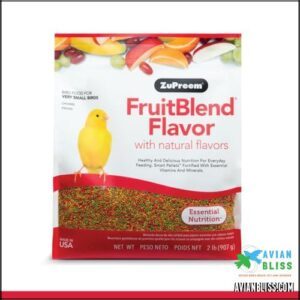
ZuPreem FruitBlend Bird Pellets are a go-to choice if you’re looking to step up your canary’s diet game.
These vibrant, fruit-flavored pellets—blended with bananas, apples, oranges, and grapes—bring variety and excitement to mealtime while delivering essential nutrition.
Packed with 21 essential vitamins and minerals, they help support your bird’s overall health, from their immune system to vibrant feather growth.
Made in the USA and recommended by veterinarians, these pellets are scientifically formulated to meet small birds’ dietary needs.
While some canaries might pause at first, the natural aroma often wins them over.
These pellets are an excellent option if you’re switching your canary off a seed-based diet.
Plus, their added aroma and flavors keep every bite satisfying for your feathered friend.
Best For: Small bird owners, including canary or finch enthusiasts, seeking a balanced, vet-recommended diet with added flavor variety.
- Packed with 21 essential vitamins and minerals for overall health.
- Includes natural fruit flavors like banana, apple, orange, and grape to appeal to birds.
- Helps transition birds from seed-based diets to a more nutritious option.
- Contains artificial colors and added sugar, which some owners may dislike.
- Higher cost compared to other seed-based or pellet options.
- May require a gradual transition period for birds unfamiliar with pellets.
2. Kaytee Finch Bird Food Blend 5lb
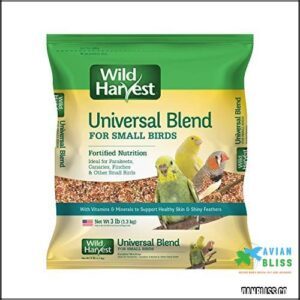
Kaytee Finch Bird Food Blend is a fantastic option for small-beaked birds like canaries.
This 5-pound bag offers a nutrient-dense mix of white millet, niger seed, and sunflower chips, ensuring a balanced diet.
The blend’s high oil content supports energy and feather health, while natural cherry flavor adds a tasty touch.
Enriched with calcium carbonate, it helps maintain strong bones.
With no fillers like milo, it encourages healthy foraging behaviors.
Store it in a cool, dry spot to keep it fresh and appealing!
Best For: Small-beaked birds like canaries, finches, and buntings needing a nutrient-rich, balanced diet.
- Contains nutrient-dense seeds like white millet, niger seed, and sunflower chips.
- Enriched with calcium carbonate for bone health.
- Encourages healthy foraging behaviors and avoids fillers like milo.
- Limited variety of seeds compared to other blends.
- May not appeal to birds accustomed to more sunflower seeds.
- Requires proper storage to maintain freshness.
3. Wild Bird Seed Collection Daily Blends
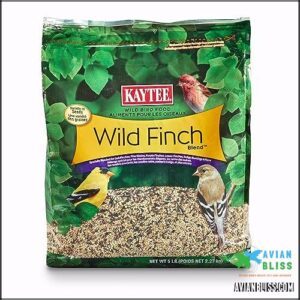
A well-rounded diet is essential for canaries, and the Wild Bird Seed Collection Daily Blends checks all the right boxes.
Packed with a nutrient-rich mix of millet, canola seed, canary grass seed, flaxseed, and Nyjer seed, this blend provides essential vitamins and minerals to support your bird’s vibrant feathers and healthy skin.
The variety of textures and flavors keeps canaries intrigued and also guarantees their dietary needs are met.
Best suited for small birds like canaries, parakeets, and finches, this blend delivers the energy and nutrients they thrive on.
While the packaging could occasionally use improvement, the freshness and seed quality make it a favorite.
It’s simple, effective, and sure to keep your feathered friend chirping with delight.
Best For: Small birds like canaries, parakeets, and finches that need nutrient-rich, high-energy seeds for vibrant feathers and healthy skin.
- Nutrient-rich mix supports healthy skin and feathers.
- Fresh, high-quality seeds loved by birds.
- Variety of textures and flavors keeps birds engaged.
- Packaging quality could be improved.
- May not be suitable for medium or large birds.
- Some seed mixes may spill during feeding.
4. Kaytee Canary Finch Food 2 lb
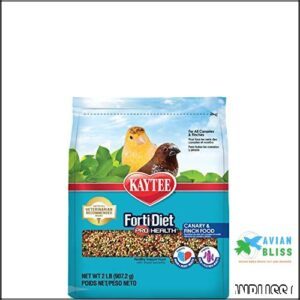
Among the finest choices for canary nutrition, Kaytee Canary Finch Food 2 lb stands tall.
Packed with essential Omega-3s, it supports both brain and heart health while enhancing feather vibrancy.
The carefully curated blend of Canary Grass Seed, Yellow Millet, and Flax Seed guarantees a balanced diet.
Fortified with probiotics, this mix nurtures digestion and boosts immunity.
Its naturally preserved freshness delights birds and owners alike.
If you’re after premium-quality nutrition in every bite, Kaytee’s formula makes feeding your canary effortless and effective.
Best For: Bird owners looking to provide canaries and finches with a balanced, nutritious diet that supports health and vibrancy.
- Contains Omega-3s for brain and heart health.
- Fortified with probiotics and antioxidants for digestion and immunity.
- Enhances skin and feather health for vibrant plumage.
- Some birds may initially pick out colored bits, leaving the rest.
- Pricing with third-party sellers may include extra shipping costs.
- Can create minor feeding mess during consumption.
5. Wild Harvest Bird Food Orange Flavor
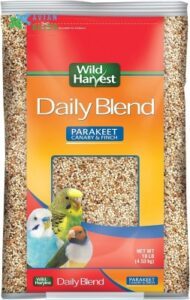
Wild Harvest Bird Food Orange Flavor is a vibrant choice for canaries, blending red and white millet, canary grass seed, and select grains with a dash of orange essence.
This daily nutrition mix is enriched with essential vitamins and minerals, promoting vibrant feathers and energy.
Its resealable bag guarantees lasting freshness, though handling during delivery could improve.
The orange flavor suits finicky eaters, making meals irresistible, and is perfect for nurturing your canary’s health while adding a burst of fruity taste to their diet.
Best For: Small pet birds like parakeets, canaries, and finches, as well as wild birds.
- Enriched with vitamins and minerals for bird health.
- Infused with orange essence, making it appealing to birds.
- Resealable packaging to maintain freshness.
- Bag durability issues reported during shipping.
- Birds consume seeds quickly, requiring frequent restocking.
- Limited size options; larger packs desired by customers.
6. Wild Harvest Canary Finch Seed Mix
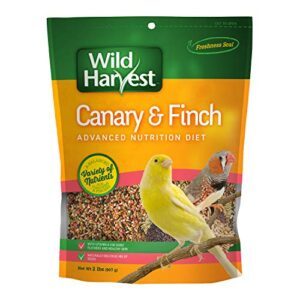
Wild Harvest Canary Finch Seed Mix is a balanced, nutrient-packed choice for your feathered friend.
Its mix of millet, canary grass seed, oat groats, and flax replicates their natural diet, encouraging healthy foraging.
Enriched with vitamins, minerals, and omega-3 fatty acids, it supports vibrant feathers and overall health.
The resealable bag keeps food fresh, while serving 1 to 3 teaspoons daily guarantees proper portioning, ensuring your canary receives a nutritional boost.
Best For: Small birds like canaries and finches needing a balanced, nutrient-rich diet that supports foraging and overall health.
- Encourages natural foraging behavior.
- Enriched with essential vitamins and omega-3 fatty acids.
- Resealable bag ensures long-lasting freshness.
- May be considered expensive by some buyers.
- Contains artificial color additives.
- Portion size needs regular adjustment based on bird consumption.
7. Dr Harveys Canary Food Blend Natural

Dr. Harvey’s Canary Food Blend Natural offers a wholesome mix of nine seeds, nine nuts, and ten fruits and vegetables, ensuring your canary receives ideal nutrition.
Free from preservatives, chemicals, and fillers, this blend promotes vibrant plumage, stronger singing, and overall well-being.
Ingredients like red millet, flaxseed, and parsley provide essential proteins, fats, and vitamins, and customers love its high-quality, non-GMO formulation, even though it’s pricier.
Packaged in the USA, it’s a perfect primary food or supplement to support your bird’s overall well-being.
Best For: Canary owners seeking a natural, preservative-free mix to enhance their bird’s health, plumage, and singing.
- Contains a variety of seeds, nuts, fruits, and vegetables for balanced nutrition.
- Free from chemicals, preservatives, and synthetic additives.
- Promotes vibrant plumage and improved singing.
- Higher price compared to standard seed mixes.
- Some customers may need to supplement for variety.
- Requires careful storage to maintain freshness.
8. Quiko Red Canary Food Supplement

Quiko Red Canary Food Supplement is a must-have for red factor canaries.
It enhances their vibrant red plumage while boosting overall health, and is packed with canthaxanthin.
The high protein content, sourced from eggs, supports feather quality and recovery during molting.
Vitamins like A, D3, and E fortify their immune system, while calcium guarantees strong bones.
You can serve it dry, moistened with water, or mixed into other foods, providing flexibility, and for best results, use it especially during the summer molt.
Best For: Red factor canaries needing enhanced red plumage and improved feather quality during molting.
- Enhances vibrant red plumage with canthaxanthin.
- High protein content supports molting and feather recovery.
- Flexible serving options (dry, moistened, or mixed with food).
- Suitable only for red factor canaries, not other bird types.
- Excess powder may remain uneaten by some birds.
- Requires careful storage to maintain freshness.
9. Vitakraft VitaSmart Bird Food Supplement
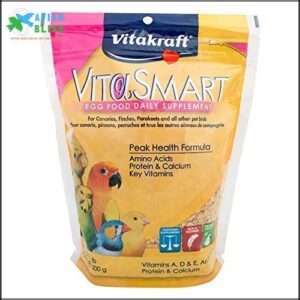
Vitakraft VitaSmart Bird Food Supplement is a versatile choice for supporting your canary’s health.
Packed with digestible protein, calcium, and essential vitamins, it’s perfect during molting, stress, or breeding.
You can sprinkle it dry over their daily diet or moisten it for a crumbly treat.
Its blend of dried egg, millet, and soybean meal promotes energy and activity, and birds enjoy the tasty variety.
Its ease of mixing with fruits or seeds guarantees balanced, long-term nutrition.
Store in a cool, dry place.
Best For: Bird owners looking to support their pet’s health during stress, molting, breeding, or nesting.
- Provides digestible protein, calcium, and essential vitamins for enhanced health.
- Versatile usage options as a dry sprinkle or moist treat.
- Combines well with fruits, greens, seeds, or sprouts for variety.
- Requires daily removal of uneaten food for safety.
- Prepared batches need refrigeration and can only last up to a week.
- Birds may have individual preferences and react differently to the supplement.
10. Volkman Canary Seed Blend 4 Lb

Volkman Canary Seed Blend 4 Lb is a superior choice to fuel your canary’s vibrant lifestyle.
Packed with carefully cleaned seeds like canary grass, rapeseed, and flax, this mix offers essential nutrients for energy and feather health.
Its natural preservatives, like safflower oil, keep the blend fresh without artificial additives.
Bonus ingredients like spinach flakes and turmeric add vitamins and antioxidants, promoting overall vitality.
Designed for picky eaters, it’s ideal for enhancing health while reducing waste thanks to its premium quality.
Best For: Canary owners seeking a high-quality, nutrient-rich seed mix to support their bird’s health and minimize waste.
- Packed with essential nutrients, vitamins, and antioxidants.
- Natural preservatives ensure freshness without artificial additives.
- Ideal for picky eaters, promoting better consumption and reduced waste.
- Some birds may not prefer the mix and toss it out.
- Occasional packaging damage reported upon delivery.
- Higher price compared to some other seed blends.
11. Quiko Egg Food Bird Supplement Daily

Sometimes, a little extra goes a long way, and that’s exactly what Quiko Egg Food Bird Supplement delivers for your canary.
Packed with real egg and honey, this supplement is rich in protein, amino acids, and key vitamins like A, D, and E, essential for peak health and conditioning.
Whether sprinkled dry on daily food or mixed with water for a moist treat, it’s highly palatable and versatile.
Perfect for rearing, breeding, or daily care, it keeps your feathered friend thriving!
Best For: Bird owners looking for a versatile, nutrient-packed supplement ideal for rearing, breeding, and supporting daily health.
- High in protein, amino acids, and essential vitamins for bird health.
- Can be served dry or mixed, adding flexibility in feeding.
- Suitable for all life stages and bird species.
- Lacks specific nutrient quantities for detailed feeding plans.
- Limited to supplemental use, not a standalone diet.
- Contains sugar, which may not be ideal for some birds’ diets.
12. Kaytee Supreme Canary and Finch Food
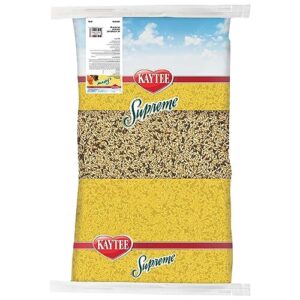
Kaytee Supreme Canary and Finch Food is a fantastic pick for keeping your feathered friend healthy and happy.
This mix combines natural seeds like canary grass, millet, and flax, enriched with essential vitamins and minerals for balanced nutrition.
Free from artificial colors and flavors, it guarantees a nutritious diet.
Fortified with calcium and vitamin D3, it supports strong bones and overall health, making it an ideal choice for small birds, and this high-quality food offers value in bulk packaging, making it perfect for long-term use.
Best For: Small bird owners, especially those with canaries and finches, seeking nutritious and affordable bird food.
- Natural seed mix with added vitamins and minerals for balanced nutrition.
- Free from artificial colors and flavors, ensuring a wholesome diet.
- Bulk 20-pound packaging offers better value for long-term use.
- Not suitable for medium or large bird species.
- Requires proper storage to maintain freshness due to large package size.
- Lacks variety in texture or additional treat options within the mix.
Dietary Considerations for Canaries
You need to provide your canary with a diet that’s carefully balanced to support its health and energy needs.
By combining nutrient-rich seeds, fresh vegetables, and safe fruits, you can guarantee your bird gets the essential vitamins, minerals, and proteins it requires.
Safe Fruits and Vegetables
Feeding your canary fresh fruits and vegetables is key to their health.
Focus on variety and nutrients with these safe options:
- Carrots – Packed with Vitamin A, essential for feathers.
- Kale – High in calcium, supporting bones.
- Apples – Sweet treat (remove seeds!).
- Sprouted Seeds – Great for protein and minerals.
Ensure proper Safe Veggie Prep and check for organic vs. non-organic options!
Avoiding Toxic Foods
Keep canaries away from toxic foods like chocolate, caffeine, apple seeds, or avocado, which can harm their health fast.
Moldy food and pesticide exposure also pose risks, as do heavy metals from unsafe dishes.
Use safe cleaning methods to avoid contamination.
Toxic plants like oleander and ivy should never be near their cage.
Always prioritize freshness and safety.
Feeding Canaries for Optimal Health
Feeding your canary the right diet is essential for their health and vitality.
By balancing seeds, pellets, and fresh foods, you’ll provide the nutrients they need for strong feathers, energy, and overall well-being.
Converting a Canary to a Pelleted Diet
Switching to a pelleted diet takes patience. Start with a gradual changeover by mixing pellets with the seed mix your canary already loves.
Observe their texture preferences and Pellet Acceptance daily, ensuring they’re eating enough. A balanced canary diet boosts health, so monitor their weight and behavior closely.
If issues arise, consult a vet to maintain Nutritional Balance. This approach will help ensure a smooth transition to the new diet and overall health.
Feeding Baby Canaries
When baby canaries hatch, their diet revolves around crop milk provided by parents.
If hand-feeding is needed, use a syringe with specially formulated egg food. Gradually introduce weaning foods like soft fruits and canary breeding food as they grow.
- Feed every 2-3 hours initially.
- Make certain food is warm, not hot.
- Avoid overfeeding.
- Include whole eggs for protein.
Breeding Canary Diet
Breeding season transforms your canary’s nutritional needs dramatically.
You’ll need to provide 25% of their body weight in food daily, focusing on protein-rich egg food and millet.
During egg-laying nutrition phases, add soaked seeds and fresh greens.
Post-breeding diet should gradually return to normal portions.
Your canary breeding food strategy directly impacts chick growth and molting success.
Canary Health and Nutrition Supplements
You’ll need to provide your canary with essential supplements beyond their daily seed and pellet diet to maintain ideal calcium levels and prevent nutritional deficiencies that can lead to serious health problems.
These targeted supplements, including cuttlebones and vitamin additions, support your bird’s bone strength, feather development, and immune system function throughout different life stages.
Cuttlebones for Canaries
Cuttlebones serve as nature’s pharmacy for your canary, delivering essential calcium carbonate that strengthens bones and maintains beak health.
This dietary supplement acts like a slow-release vitamin, providing consistent mineral intake while your bird naturally trims its beak.
You can find various avian cuttlebones online.
Here are three key cuttlebone benefits:
- Calcium Intake Enhancement – Prevents egg-binding in females and supports skeletal development
- Beak Strength Maintenance – Natural grinding action keeps beaks properly shaped and healthy
- Mineral Source Reliability – Provides consistent calcium supplementation without overdosing risks
Other Essential Supplements
Beyond cuttlebones, your canary needs additional supplements for peak health.
Grit supplementation aids digestion, while probiotics benefits include improved gut health. Mineral blocks provide ongoing nutrition support.
Liquid vitamins offer easy absorption, and iodine needs are met through specialized drops. For proper grit products, consider online sources.
Choose vitamin enriched canary food and mineral rich canary food containing Omega 3s and Omega 6 for overall wellness.
Maintaining Canary Food Freshness
Fresh canary food maintains its nutritional value when you store it properly in airtight containers within cool, dry environments, preventing rancidity that occurs when oils in seeds break down over time.
You’ll recognize spoiled food through visual signs like mold growth, color changes, and unusual odors that indicate bacterial contamination, which can seriously harm your canary’s digestive system and overall health.
Proper Storage Techniques
Your canary’s health depends on proper canary food storage methods that preserve nutritional value.
Store seeds and pellets in airtight containers to maintain freshness and prevent spoilage. Room temperature storage works well, but cool storage areas extend shelf life substantially.
Follow these storage guidelines:
- Use airtight containers made of glass or BPA-free plastic to block moisture and air exposure
- Choose cool, dry locations away from direct sunlight and heat sources like stoves or radiators
- Implement pest control measures by cleaning storage areas regularly and checking for insect activity
- Label containers with purchase dates to track freshness and rotate older stock first
- Avoid refrigeration as condensation can promote mold growth and reduce seed viability
Signs of Spoilage in Canary Food
Watch for telltale signs that your canary food has gone bad.
Mold growth appears as fuzzy patches on seeds or pellets. Pest infestation brings unwanted bugs crawling through containers.
A rancid odor signals oils have turned, while discoloration shows nutrient breakdown. Clumping indicates moisture damage.
These red flags mean it’s time to toss contaminated bird food and protect your feathered friend’s health. The presence of these issues is a clear sign that the food is no longer safe for consumption, and it’s essential to replace it to prevent harm to your feathered friend.
Frequently Asked Questions (FAQs)
What is the best food for canary birds?
You’ll want a high-quality seed mix containing canary seed, rapeseed, and linseed as your bird’s foundation.
Add fresh leafy greens daily, plus quality pellets to prevent nutritional deficiencies and keep your feathered friend thriving.
What is the best seed for canaries?
You’ll want plain canary seed as your foundation, mixed with rapeseed, linseed, and yellow biscuit. This combination provides ideal nutrition while preventing obesity that comes from single-seed diets alone.
What is the best bird seed to attract colorful birds?
You’ll attract vibrant cardinals, goldfinches, and blue jays with sunflower seeds, nyjer for finches, safflower for cardinals, and mixed berry blends.
Bright seed feeders and fresh water complete your colorful backyard bird paradise.
What is the best color feed for canaries?
Research shows that 85% of canary owners notice improved feather vibrancy within weeks of adding color-enhancing foods.
You’ll want Haith’s Ready Mixed Colour Food with Robin Red protein, which naturally boosts your bird’s brilliant yellow and orange plumage through carotenoid-rich ingredients.
What is the best bird food for a canary & Finch?
You’ll want high-quality pellets like ZuPreem FruitBlend or Kaytee Finch Blend as your foundation.
This combo delivers the balanced nutrition both species need to thrive.
Mix in canary seed, millet, and fresh greens daily.
What do canary birds eat?
Like tiny feathered gourmets, your canaries thrive on a balanced menu of 70% high-quality seeds or pellets, plus 30% fresh vegetables and fruits.
They’ll relish leafy greens, carrots, and apples while avoiding toxic avocados, which is crucial for their health and well-being, making balanced menu a key factor.
How do I choose the best canary bird food?
Check the ingredient list first – you’ll want high-quality canary seed, rapeseed, and linseed as main components.
Avoid fillers like ground corn.
Choose pellets with 21 essential vitamins, and make certain of proper seed-to-beak size matching, ensuring a good mix of nutrients for optimal health with essential vitamins.
Can a canary eat commercial bird food?
Commercial bird food can’t be your canary’s sole lifeline, yet it’s absolutely their foundation.
You’ll need quality seed mixes containing canary seed, rapeseed, and linseed, but supplement with fresh vegetables and fruits for complete nutrition.
What is the best food for Canaries?
You’ll want to feed your canary a balanced diet of 70% high-quality seeds or pellets, plus 30% fresh vegetables and greens daily. Skip iceberg lettuce and avocado—they’re nutritionally poor or toxic.
Do canaries make good pets?
Canaries make excellent pets for you if you’re seeking a cheerful, low-maintenance companion.
They’re social, melodious singers who don’t require handling, making them perfect for busy lifestyles while providing delightful entertainment daily, which can be considered delightful.
Conclusion
Like a master chef crafting the perfect recipe, you’ve now discovered the finest bird food for canaries that’ll transform your feathered friend’s health.
Remember that premium ingredients like canary grass, flaxseed, and niger seeds form the foundation of excellent nutrition.
Whether you choose pellets or seed mixes, prioritize quality over quantity and avoid artificial fillers.
Your canary’s vibrant colors and melodic songs will thank you for investing in their nutritional well-being with these carefully selected options, providing a clear example of the importance of nutritional well-being.

